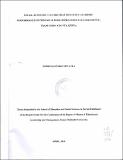| dc.description.abstract | Children are e'ntitled to a free quality of education. In order to achieve this, in 2008, '. UNESCO came up with the Millennium Development Goals to be achieved by 2015. One of the goal entailed achieving Universal Primary Education. By the year 2015, when the MDG were supposed to have been achieved has come and gone, yet school attendance, especially for girls, is far from being achieved. Consequently, UNESCO came up with Sustainable Development Goals, so as, to continue working on what had not been achieved and to sustain what had already been achieved. In an ideal situation, it is expected that all primary school pupils are exposed to a learning environment characterized by the provision of basic inputs towards their education in form of school fees, stationeries, and good diet. Many children in Kenya drop out of school before completing their primary education. The purpose of this study was, therefore, to assess the social-economic factors that influence academic performance of primary school pupils in Kwanza sub-county, Trans Nzoia County, Kenya. The study used descriptive survey research design. The target population in this study constituted all the public primary schools in Kwanza Sub-County. The target population in this study consisted of 97 head teachers and 973 teachers, adding up to 1070 respondents. Using 10%, a sample of 10 head teachers and 97 teachers were selected from the respective categories of subjects. The researcher used simple random sampling in which respondents had equal chances to participate in this study. The teachers were drawn from the same schools from which the head teachers were selected. Questionnaires were used to collect data. Both open ended and close ended questions, were developed in line with the research objectives. Open-ended questions enabled the respondents to give their opinions about the study freely. The data collection instruments were pilot tested for validity and reliability before they were fully used for data collection. The researcher personally collected the data at agreed times and after appropriate authorization by the National Commission for Science, Technology and Innovation, as well as, the County Commissioner. The data was analyzed with the help of Microsoft Excel version 2016 which helped in computing descriptive statistics which included proportions and percentages. The results obtained were presented using tables, frequencies and percentages. The findings of this study show that low socio¬economic status of the parents have a significantly negative effect on academic performance, as parents are unable to cater for basic needs such as food, uniform and educational resources, for their children. This leads to absenteeism in schools and hence, learners are not able to learn consistently. For academic performance to improve in this region the Government of Kenya must ensure that Free Primary Education programme is consistent by providing learning materials such as books and introduce free lunch programmes to all schools, in order to retain pupils in schools from low socio-economic families. The Government, non-governmental organizations and religious organizations should train parents on the best way of utilizing the resources they have in order to eradicate poverty in the region. | en_US |

